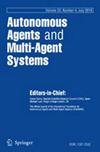Ability and knowledge: from epistemic transition systems to labelled stit models
IF 2.6
3区 计算机科学
Q3 AUTOMATION & CONTROL SYSTEMS
引用次数: 0
Abstract
It is possible to know that one can guarantee a certain result and yet not know how to guarantee it. In such cases one has the ability to guarantee something in a causal sense, but not in an epistemic sense. In this paper we focus on two formalisms used to model both conceptions of ability: one formalism based on epistemic transition systems and the other on labelled stit models. We show a strong correspondence between the two formalisms by providing mappings from the former to the latter for both the languages and the structures. Moreover, we demonstrate that our extension of labelled stit logic is more expressive than the logic of epistemic transition systems.
能力与知识:从认识论过渡系统到标记的 Stit 模型
我们有可能知道可以保证某个结果,但却不知道如何保证。在这种情况下,一个人具有因果意义上的保证能力,但不具有认识意义上的保证能力。在本文中,我们将重点讨论两种用来模拟这两种能力概念的形式主义:一种是基于认识论转换系统的形式主义,另一种是基于标签 Stit 模型的形式主义。通过提供从前者到后者的语言和结构映射,我们证明了这两种形式主义之间的紧密对应关系。此外,我们还证明了我们对标签 stit 逻辑的扩展比表观转换系统逻辑更具表现力。
本文章由计算机程序翻译,如有差异,请以英文原文为准。
求助全文
约1分钟内获得全文
求助全文
来源期刊

Autonomous Agents and Multi-Agent Systems
工程技术-计算机:人工智能
CiteScore
6.00
自引率
5.30%
发文量
48
审稿时长
>12 weeks
期刊介绍:
This is the official journal of the International Foundation for Autonomous Agents and Multi-Agent Systems. It provides a leading forum for disseminating significant original research results in the foundations, theory, development, analysis, and applications of autonomous agents and multi-agent systems. Coverage in Autonomous Agents and Multi-Agent Systems includes, but is not limited to:
Agent decision-making architectures and their evaluation, including: cognitive models; knowledge representation; logics for agency; ontological reasoning; planning (single and multi-agent); reasoning (single and multi-agent)
Cooperation and teamwork, including: distributed problem solving; human-robot/agent interaction; multi-user/multi-virtual-agent interaction; coalition formation; coordination
Agent communication languages, including: their semantics, pragmatics, and implementation; agent communication protocols and conversations; agent commitments; speech act theory
Ontologies for agent systems, agents and the semantic web, agents and semantic web services, Grid-based systems, and service-oriented computing
Agent societies and societal issues, including: artificial social systems; environments, organizations and institutions; ethical and legal issues; privacy, safety and security; trust, reliability and reputation
Agent-based system development, including: agent development techniques, tools and environments; agent programming languages; agent specification or validation languages
Agent-based simulation, including: emergent behavior; participatory simulation; simulation techniques, tools and environments; social simulation
Agreement technologies, including: argumentation; collective decision making; judgment aggregation and belief merging; negotiation; norms
Economic paradigms, including: auction and mechanism design; bargaining and negotiation; economically-motivated agents; game theory (cooperative and non-cooperative); social choice and voting
Learning agents, including: computational architectures for learning agents; evolution, adaptation; multi-agent learning.
Robotic agents, including: integrated perception, cognition, and action; cognitive robotics; robot planning (including action and motion planning); multi-robot systems.
Virtual agents, including: agents in games and virtual environments; companion and coaching agents; modeling personality, emotions; multimodal interaction; verbal and non-verbal expressiveness
Significant, novel applications of agent technology
Comprehensive reviews and authoritative tutorials of research and practice in agent systems
Comprehensive and authoritative reviews of books dealing with agents and multi-agent systems.
 求助内容:
求助内容: 应助结果提醒方式:
应助结果提醒方式:


